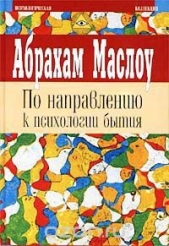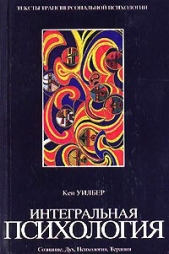По направлению к психологии бытия. Религии, ценности и пик-переживания

По направлению к психологии бытия. Религии, ценности и пик-переживания читать книгу онлайн
Абрахам Маслоу - выдающийся ученый, один из самых ярких представителей гуманистической психологии, провозгласившей новый способ восприятия и мышления, новый образ человека и общества, новое понятие об этике и человеческих ценностях.Сделав колоссальный шаг от психологии, имеющей дело с патологией и аномальным поведением, к учению об актуализации и самосовершенствованию, Маслоу подошел к истокам возникновения `четвертой силы` - трансперсональной психологии.В своей книге он продолжает начатую работу по созданию основ для `формирования единой психологии и философии, включающей в себя как глубины, так и высоты человеческой природы`. Это попытка соединить `психологию развития и роста` с психопатологией, психоаналитической динамикой и движением к целостности.Для психологов, психотерапевтов, учащихся и всех интересующихся вопросами гуманистической психологии.
Внимание! Книга может содержать контент только для совершеннолетних. Для несовершеннолетних чтение данного контента СТРОГО ЗАПРЕЩЕНО! Если в книге присутствует наличие пропаганды ЛГБТ и другого, запрещенного контента - просьба написать на почту [email protected] для удаления материала
KORZYBSKI, A. Science and Sanity: An Introduction to Non-Aristotelian Systems and General Semantics (1933). Lakeville, Conn.: International Non-Aristotelian Lib. Pub. Co., 3rd ed., 1948.
KRIS, E. Psychoanalytic Explorations in Art. Int. Univs. Press, 1952.
KRISHNAMURTI, J. The First and Last Freedom. Harper, 1954.
KUBIE, L.S. Neurotic Distortion of the Creative Process. Univ. of Kans., 1958.
KUENZLI, A.E. (ed.) The Phenomenological Problem. Harper, 1959.
LEE, D. Freedom & Culture. A Spectrum Book, Prentice-Hall, 1959.
———— Autonomous motivation, J. Humanistic Psychol., 1962, 1, 12-22.
LEVY, D.M. Personal communication.
———— Maternal Overprotection. Columbia Univ., 1943.
91a. LEWIS, C.S.
Surprised by Joy
. Harcourt, 1956.
LYND, H.M. On Shame and the Search for Identity. Harcourt, 1958.
MARCUSE, H. Eros and Civilization. Beacon, 1955.
MASLOW, A.H. and MITTELMANN, B. Principles of Abnormal Psychology. Harper, 1941.
MASLOW, A.H. Experimentalizing the clinical method, J. Clinical Psychol., 1945, 1, 241-243.
———— Resistance to acculturation, J. Soc. Issues, 1951, 7, 26-29.
96a. ———— Comments on Dr. Old's paper, in: Jones, M.R.(ed.)
Nebraska Symposium on Motivation
, 1955. Univ. of Neb., 1955.
———— Motivation and Personality. Harper, 1954.
———— A philosophy of psychology, in: Fairchild, J. (ed.) Personal Problems and Psychological Frontiers. Sheridan, 1957.
———— Power relationships and patterns of personal development, in: Kornhauser, A. (ed.) Problems of Power in American Democracy. Wayne Univ., 1957.
———— Two kinds of cognition. General Semantics Bulletin, 1957, Nos. 20 and 21, 17-22.
———— Emotional blocks to creativity, J. Individ. Psychol., 1958, 14, 51-56.
———— (ed.) New Knowledge in Human Values. Harper, 1959.
———— , RAND, H. and NEWMAN, S. Some parallels between the dominance and sexual behavior of monkeys and the fantasies of psychoanalytic patients, J. of Nervous and Mental Disease, 1960, 131, 202-212.
———— Lessons from the peak-experiences, J. Humanistic Psychol., 1962, 2, 9-18.
———— , and DIAZ-GUERRERO, R. Juvenile delinquency as a value disturbance, in: Peatman, J., and Hartley, E. (eds.). Festschrift for Gardner Murphy. Harper, 1960.
———— Peak-experiences as completions. (To be published.)
———— Eupsychia — the good society, J. Humanistic Psychol., 1961, 1, 1-11.
———— , and MINTZ, N. L. Effects of esthetic surroundings: I. Initial short-term effects of three esthetic conditions upon perceiving "energy" and "well-being" in faces, J. Psychol., 1956, 41 247-254.
MASSERMAN, J. (ed.) Psychoanalysis and Human Values. Grane and Stratton, 1960.
MAY, R., et al. (eds.) Existence. Basic Books, 1958.
———— (ed.) Existential Psychology. Random House, 1961.
MILNER, M. (Joanna Field, pseudonym). A Life of One's Own. Pelican Books, 1952.
MILNER, M. On Not Being Able to Paint. Int. Univs. Press, 1957
MINTZ, N.L. Effects of esthetic surroundings: II. Prolonged and repeated experiences in a "beautiful" and an "ugly" room, J. Psychol, 1956, 41, 459-466.
MONTAGU, ASHLEY, M.F. The Direction of Human Development. Harper, 1955.
115a. MORENO, J. (ed.)
Sociometry Reader
. Free Press, 1960.
MORRIS, C. Varieties of Human Value. Univ. of Chicago, 1956.
MOUSTAKAS, C. The Teacher and the Child. McGraw-Hill, 1956.
———— (ed.) The Self. Harper, 1956.
MOWRER, О.Н. The Crisis in Psychiatry and Religion. Van Nostrand, 1961.
MUMFORD, L. The Transformations of Man. Harper, 1956.
MUNROE, R.L. Schools of Psychoanalytic Thought. Dryden, 1955.
MURPHY, G. Personality. Harper, 1947.
MURPHY, G., and HOCHBERG, J. Perceptual development: some tentative hypotheses, Psychol Rev., 1951, 58, 332-349.
MURPHY, G. Human Potentialities. Basic Books, 1958.
MURRAY, H.A, Vicissitudes of Creativity, in: Anderson H.H., (ed.) Creativity and Its Cultivation. Harper, 1959.
NAMECHE, G. Two pictures of man, J. Humanistic Psychol., 1961 1, 70-88.
NIEBUHR, R. The Nature and Destiny of Man. Scribner's, 1947.
127a. NORTHROP, F.C.S.
The Meeting of East and West
. Macmillan, 1946.
NUTTIN, J. Psychoanalysis and Personality. Sheed and Ward, 1953.
O'CONNELL, V. On brain washing by psychotherapists: The effect of cognition in the relationship in psychotherapy. Mimeographed, 1960.
129a. OLDS, J. Physiological mechanisms of reward, in: Jones, M.R. (ed.)
Nebraska Symposium on Motivation, 1955
. Univ. of Nebr., 1955.
OPPENHEIMER, O. Toward a new instinct theory, J. Social Psychol., 1958, 47, 21-31.
OVERSTREET, H.A. The Mature Mind. Norton, 1949.
OWENS, С.М. Awakening to the Good. Christopher, 1958.
PERLS, F., HEFFERLINE, R. and GOODMAN, P. Gestalt Therapy. Julian, 1951
PETERS, R.S. "Mental health" as an educational aim. Paper read before Philosophy of Education Society, Harvard University, March, 1961.
PROGOFF, I. Jung's Psychology and Its Social Meaning. Grove, 1953.
PROGOFF, I. Depth Psychology and Modem Man. Julian, 1959.
RAPAPORT, D. Organization and Pathology of Thought. Columbia Univ., 1951
REICH, W. Character Analysis. Orgone Inst., 1949.
REIK, T. Of Love and Lust. Farrar, Straus, 1957.
RIESMAN, D. The Lonely Crowd. Yale Univ., 1950.
RITCHIE, B.F. Comments on Professor Farber's paper, in: Jones, M.R. (ed.) Nebraska Symposium on Motivation. Univ. of Nebr., 1954, 46-50.
ROGERS, C. Psychotherapy and Personality Change. Univ. of Chicago, 1954.
———— A theory of therapy, personality and interpersonal relationships as developed in the client-centered framework, in: Koch, S. (ed.) Psychology: A Study of a Science, Vol. III. McGraw-Hill, 1959.
———— Therapist's View of Personal Goals. Pendle Hill, 1960.
———— On Becoming a Person. Houghton Mifflin, 1961.
ROKEACH, M. The Open and Closed Mind. Basic Books, 1960.
SCHACHTEL, E. Metamorphosis. Basic Books, 1959.
SCHILDER, P. Goals and Desires of Man. Columbia Univ., 1942.
———— Mind, Perception and Thought in Their Constructive Aspects. Columbia Univ., 1942.
SCHEINFELD, A. The New You and Heredity. Lippincott, 1950.
SCHWARZ, O. The Psychology of Sex. Pelican Books, 1951.
SHAW, F.J. The problem of acting and the problem of becoming, J. Humanistic Psychol., 1961, 1, 64-69.
SHELDON, W.H. The Varieties of Temperament. Harper, 1942.
SHLIEN, J.M. Creativity and Psychological Health. Counseling Center Discussion Paper, 1956, 11, 1-6.
———— A criterion of psychological health, Group Psychotherapy 1956, 9, 1-18.
SINNOTT, E.W. Matter, Mind and Man. Harper, 1957.
SMILLIE, D. Truth and reality from two points of view, in: Moustakas, C. (ed.) The Self. Harper, 1956.
157a. SMITH, M.B. "Mental health" reconsidered: A special case of the problem of values in psychology,


























